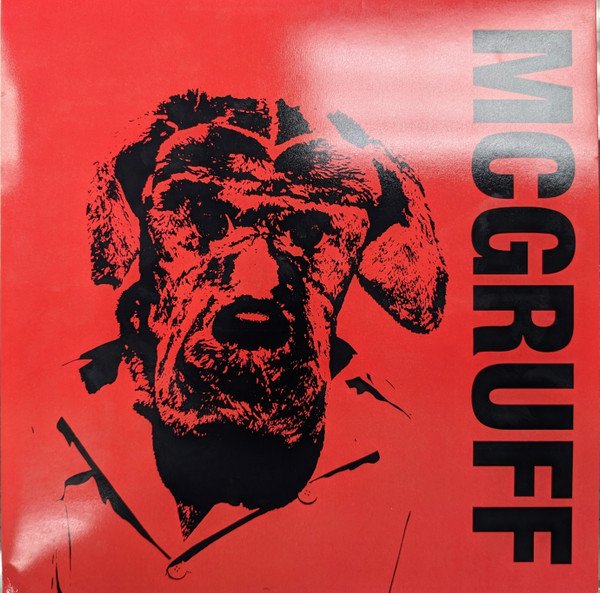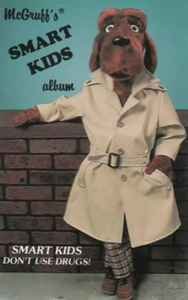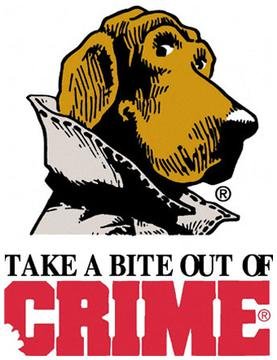The 1986 Kiddie Anti-Drug Manifesto McGruff’s Smart Kids Album Is a Sonic Delight. Too Bad About the Lyrics and Singing!
What I find fascinating about Cartoon Rescue All-Stars to the Rescue is the brazenly off-brand nature of the enterprise. Cartoon characters are unapologetic hedonists concerned only with their own pleasure.
They aren’t about to channel Nancy Reagan and deliver rants about the evils of marijuana. That’s more McGruff the Crime Dog’s thing.
McGruff is the most kid-friendly of Drug Warriors. Though perpetually clad in a trench coat, the unofficial uniform of 1970s flashers and porn movie theater devotees as well as gumshoes, McGruff serves as the affable canine face of law enforcement.
McGruff is cute but not too cute, to the point where children would be tempted to scratch behind his ears and ask him if he’s a good boy while he’s lecturing them about not getting kidnapped or experimenting with heroin.
McGruff was conceived as an enemy of crime who, on an existential level, "was tired” and embodied the world-weary detective tradition of Phillip Marlowe and Columbo.
McGruff was not too world-weary, however, to make multiple forays into the world of music, most notably with the shockingly infectious 1986 anti-drug manifesto McGruff’s SMART KIDS album.
It’s eleven tracks and just under a half-hour of sadistically catchy jams that are as sophisticated musically as they are egregiously terrible from a lyrical and vocal standpoint.
The only thing keeping this McGruff the Crime Dog album from being an absolute delight, a stone cold banger, is that it’s a McGruff the Crime Dog album that makes the bold if inexplicable choice to center on a man who nails McGruff’s gruff growl during the spoken-word portions of songs, but cannot sing. At all.
The man voicing McGruff here has a poignantly terrible rasp of a croon that regularly wanders far off key, strains audibly throughout to hit even modestly challenging notes, and has no range whatsoever.
Listening to McGruff’s SMART KIDS Album on repeat my heart broke for the poor man who was forced to sing an entire album when he barely has the voice for a thirty second jingle.
The cassette’s weird, fascinating tension consequently comes from the voice actor playing McGruff’s inherently doomed attempts to showcase a talent he does not possess (singing) as well as the impossibly vast gulf between its breezy, assured musicality and caveman-primitive lyrics.
It’s hard to tell who McGruff’s Smart Kids is even for, aside from the titular smart kids, of course. Much of the album is pitched very overtly to elementary school age children who might be offered drugs at some point in their adolescence and need to cultivate the strength to reject peer pressure.
The wonderfully titled “Crack and Cocaine,” however, opens with the decidedly adult assertion, “Using crack and cocaine to get high/that’s what you say you love,” which seems targeted less at impressionable, at-risk moppets than stressed out stockbrokers who have just started freebasing after work.
In “Crack and Cocaine” McGruff delivers some tough love, with the emphasis on tough, to the kind of hopeless addict who tells people like the narrator of the song, “Using crack and cocaine to get high that’s what I love.”
Call me cynical or naïve, but I doubt that even people in the dark depths of cocaine addiction would be that open about the nature of their predilections.
Over slick electronic piano that is one of the project’s many nods to Yacht Rock, McGruff confronts a crack and cocaine addict with dour judgment in the form of the lyrics, “Just a snort or a smoke, in your greed/That’s all you care about/But your life is a joke/And you need someone to help you out.”
“Crack and Cocaine” is bound to raise some very thorny, very complicated questions in the minds of small children. It is then up to each parent to decide whether they want to explain that by “smoke” the funny animal crime stopper is talking about freebasing cocaine in rock form, or whether he’s specifically referring to smoking crack through a pipe, or “sucking the glass dick,” as it is colloquially known.
Yes, it’s almost as if a song directed at a proud freebaser of rock cocaine or a crack addict does not belong on a cassette targeted at keeping kiddies in school and off the pipe.
Despite its title, McGruff’s Smart Kids Album has never been available in album form, which is one of SEVERAL curious things about it. I’m also struck by the weird, sad minimalism of its cover art, which depicts someone in a McGruff costume standing in front of a fake brick wall in a tableau that suggests he’s equally likely to interview a witness to a homicide or perform his tightest five-minute set at Señor Frog’s Chuckle Hut as an opening act in 1985.
Before it can teach kids about the dangers of freebasing cocaine, McGruff’s SMART KIDS Album gets off to a deceptively competent start with “Winners Don’t Use,” a jaunty jingle with upbeat ragtime piano that wisely doesn’t challenge the cursed soul playing McGruff’s supremely limited voice.
That opening ditty marks the final time poor McGruff does not embarrass himself vocally by attempting songs and vocals far beyond his meager ability.
The diamond pure core of McGruff’s Smart Kids Album is a four song mini-concept-album breathlessly over-hyping the dangers of mood-altering substances in McGruff’s trademark strangled-dog rasp.
Listening to “Marijuana,” I alternated between enjoying the song’s infectious groove and thinking up counterarguments to its asinine assertions.
“NEVER TRY/Marijuana don’t try it at all/It’s a lie! It’s like beating your head on a wall,” McGruff primly asserts. All I can say is that if the shit that McGruff is smoking makes him feel like he’s beating his head on a wall, he needs to find a new dealer.
I hate to disagree with this fear-mongering Reagan-era icon of law and order, but marijuana has done an awful lot of good for an awful lot of people. The music of the Beatles, for example, would be boring as shit if they hadn’t started toking up.
But McGruff isn’t ready to have that conversation yet, so he pretends that marijuana will destroy your life and send you on the fast track to eternal damnation.
In one of many spoken-word interludes, McGruff repeats the “gateway drug” fallacy when he states, “A lot of people think marijuana ISN’t dangerous. But they’re wrong! Because not only does it harm a person’s body and mind, but it often leads users to try other, even MORE dangerous drugs!”
What kind of drugs? Why inhalants, for starters! On “Inhalants” McGruff croaks a dire warning about their being “danger in inhalants” over an infectious New Wave/Funk groove that’s half New Order mid-period B-side and half “Billie Jean” bass alongside wildly out of place kiddie back-up vocals.
Whoever signed their children up to sing “Don’t do inhalants” and “Breathing them is really no thrill!” for government propaganda purposes needs to lose custody of their young ones as a result.
Musically, some very talented people put a lot of thought and effort into making McGruff’s Smart Kids Album sound infinitely better than it has any right to. Lyrically, however, these same folks seem to always go with their first lazy instinct, confident that in a world where “pain,” “brain,” and “insane” all rhyme, there’s no point putting in an iota more effort into a faceless, thankless gig than is absolutely necessary.
The wildly over-achieving first half of McGruff’s Smart Kids alum ends with its best song. It’s a sultry, sexy, shockingly sophisticated number with a Steely Dan by way of early Santana vibe called “Alcohol.”
The intricate, Latin-inflected guitar solo that begins the song transports listeners to a hazy black velvet fantasy world where the women are beautiful and scantily clad, the drinks are strong. and the pungent smell of opium fills the air.
Then the crooning cartoon canine breaks the spell by yowling, “Hey, O-PEN up your EYES/You’ve GOT to see/Alcohol fills your world with lies/Listen to me!” When McGruff is backed by adults with lovely voices, it’s jarring because the only voices we’ve heard up to this point belong to either children or a man pretending to be a cartoon dog.
The second side of McGruff’s Smart Kids Album is not as inspired as the first, but it ends on an agreeably bonkers note with, “I’m Glad I’m Me,” a self-esteem anthem so over-the-top in its overly caffeinated optimism that it begins to feel like a Devo musical manifesto minus the irony or satire.
On a sonic level “I’m Glad I’m Me” recalls Devo as well. It’s a weird song, with elastic synths, a jittery cocaine groove and robotic back-up vocals that seem to come out of nowhere.
McGruff’s Smart Kids Album unintentionally illustrates why the Drug War was doomed to failure. It treats every drug, from the wine spritzer your mom enjoys after work to crack cocaine as pretty much the exact same: dangerous, destructive, and deadly, with the ability to get users hooked the first time around.
That’s not how it works. Marijuana is a much different substance than crack, just as inhalants are different than alcohol. Yet McGruff’s Smart Kids Albums tars them all with the same oversized brush.
Because McGruff’s Smart Kids Album is Drug War propaganda it is a goddamn lie. It’s not a benign or harmless lie either.
Lying to children about the dangers of using drugs can have tremendously harmful consequences. I grew up in the Just Say No 80s, when adults subscribed to the curious notion that the best way to keep children on a straight and narrow path was to lie to them about the potential dangers of sex, drugs, and rock and roll.
So, when I began experimenting with marijuana and realized that it was nowhere near as destructive as I had been led to believe I lost faith in the anti-drug programming I grew up with.
When people lie to you about something important you stop believing them. You don’t trust them. You don’t respect them.
McGruff’s Smart Kids Album lies blatantly and unashamedly to children about drugs and alcohol for just under twenty-eight minutes, but its surprisingly catchy music makes the never-ending falsehoods easier to bear, if not believe.
Did you enjoy this article? Then you will LOVE the Flaming Garbage Fire Edition of The Joy of Trash because it includes this piece and 51 more just like it!
Buy The Joy of Trash: Flaming Garbage Fire Extended Edition at https://www.nathanrabin.com/shop and get a free, signed "Weird Al” Yankovic-themed coloring book for free! Just 18.75, shipping and taxes included! Or, for just 25 dollars, you can get a hardcover “Joy of Positivity 2: The New Batch” edition signed (by Felipe and myself) and numbered (to 50) copy with a hand-written recommendation from me within its pages. It’s truly a one-of-a-kind collectible!
Or you can buy The Joy of Trash from Amazon at https://www.amazon.com/Joy-Trash-Nathan-Definitive-Everything/dp/B09NR9NTB4/ref=tmm_pap_swatch_0?_encoding=UTF8&qid=&sr= but why would you want to do that?
Check out my new Substack at https://nathanrabin.substack.com/
And we would love it if you would pledge to the site’s Patreon as well. https://www.patreon.com/nathanrabinshappyplace











